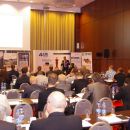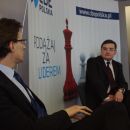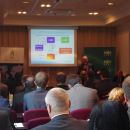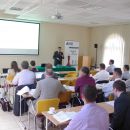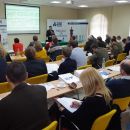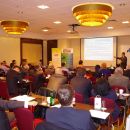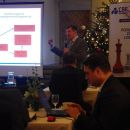| 8:00 - 9:00 |
Registration and the morning coffee. Opening of the seminar. Welcoming participants by the organizers and partners of the event |
| 9:00 - 9:40 |
Introductory lecture:
Cogeneration in the Energy Law, RES Law and the development of cogeneration in the EU
- The intentions of the energy policy makers in the European Union, the key elements of Directive 2004/8/ EC
- Development trends of the regulatory environment for CHP plants in Europe
- The contribution of working groups in the future evolution of CHP
- Potential investments in cogeneration in the context of legal rammifications after 2018
|
| 9:40 - 10:20 |
|
| 10:20 - 11:20 |
Panel discussion:
- Future support system for industrial and grid – CHP Plants
- How should the auction system for cogeneration look like?
- Cogeneration and the permissible government support, the effect of incentive
- Current problems in the development of cogeneration investments
- Analysis of historical data in creation of the intelligent heating system
- Avoiding overestimation of power generation
- The level of expected return on investments vs. regulatory uncertainty
- Flexible cogeneration as one of the pillars of energy security
|
| 10:20 - 11:40 |
Coffee Break |
| 11:40 - 12:05 |
Strategic Partner Speech:
Cogeneration from the point of view of energy company - PGNiG TERMIKA
- What in cogeneration units should the mix of technology and fuel assume in the years 2020-30 (waste, biomass domestic, gas)
- What is the status of the development of cogeneration in Poland. The reasons for cogeneration investments hold up.
- How to support the development of cogeneration - will the power market be helpful for the cogeneration sector?
- What should be the mechanism of support for cogeneration - the system of certificates of origin or auction system compliant with the EC guidelines
- Traps for investments started under the provisions on state support - the problem of incentive and other
- Conclusions - how to support cogeneration in accordance with EC guidelines and minimization of social costs
|
| 12:05 - 12:30 |
Strategic Partner Speech:
- Presentation of solutions and technologies related to the rapid and efficient district heating in reference to the changing energy markets.
- Cooperation of cogeneration units with the DSOs / TSOs at the time of upcoming distributed energy systems
- The quality of heat and electricity delivery
- End user demand
|
| 12:30 - 12:55 |
Audits for CHP
- methodology review in determining the input data
- review and evaluation of data management
- review of procedures and instructions for monitoring in cogeneration
- verification of the correctness of calculationsreview and evaluation of measurement and settlement systems, in accordance with the requirements of the reference documentsvalidation of the methodology used for determining high-efficiency cogeneration
- verification and confirmation of the current status, the assessment of additions and changes
|
| 12:55 - 13:20 |
Strategic Partner Speech:
Lecture on models of financing and co-financing of the cogeneration investments. |
| 13:20 - 14:10 |
Lunch Break |
| 14:10 - 14:35 |
Case study:
Lecture dedicated to sewage treatment plant experience in producing energy in cogeneration from sewage sludge. |
| 14:35 - 15:35 |
Panel discussion:
Cogeneration for energy companies and cogeneration for energy-intensive companies
- Cogeneration for energy companies and cogeneration for energy-intensive companies
- Why energy-intensive businesses with high demand for thermal energy do not decide to take up cogeneration?
- Problems arising from the current form of public tenders
- Competing prices vs. competing portfolio, service, etc.
- Support for urban cogeneration vs. support for industrial cogeneration
- Problems in obtaining support in the absence of energy re-sale policy
- Sustainable development - cooperation of system based CHP plants with local industry
|
| 15:35 - 16:00 |
Case study:
Cogeneration vs. Public Procurement Law
- How to move away from price as the main criterion of a tender? - Non-financial evaluation criteria
- Preparing a good agreement and avoiding risks
- Checking the credibility of contractors and subcontractors
- Audits and errors in control results
|
| 16:00 - 16:25 |
Case study:
Air conditioning systems powered by network heat |
| 16:25 - 16:30 |
Summation and conclusion
Seminar Moderator Sumary |







































